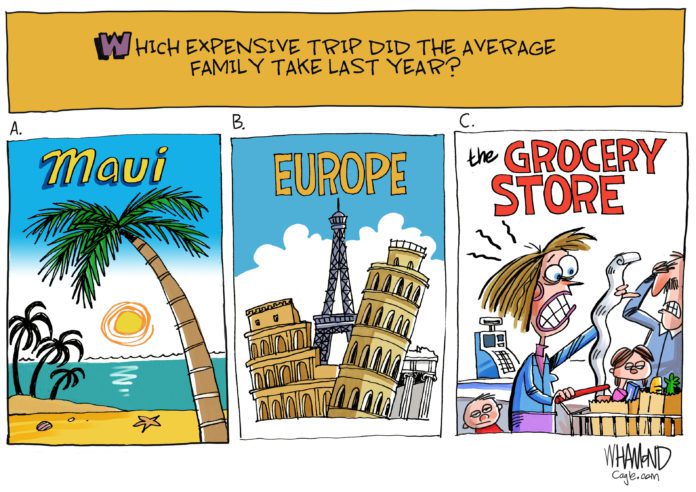The bad news – as anyone buying groceries or gasoline realizes – is that prices have increased. The encouraging news is that Americans have zeroed in on who to blame – and it’s not the government.
The action group Fight Corporate Monopolies released polling results in early March that showed 82% of voters agreed with the statement “Prices are in-part rising because big corporations are jacking up prices, and passing higher costs to consumers while making record profits. Elected officials must take on powerful CEOs and rein in corporate greed to lower prices.”
The scope of the problem? On March 12, Jake Johnson of Common Dreams reported that “700 U.S. billionaires got $1.7 trillion richer during two years of pandemic. A new analysis finds that the 704 billionaires in the U.S. now own more wealth than the bottom half of Americans – roughly 165 million people.”
FCM reported, “A February national Gallup survey found 49% of Americans say rising prices have caused hardship for their family. The same survey found that two-thirds of adults making less than $40,000 and 56% of middle-class Americans reported that rising prices are causing them at least moderate hardship.”
Johnson’s story cited Frank Clemente, executive director for Americans for Tax Fairness as saying, “For billionaires, it’s been two years of raking in the riches, while for most families it’s been two years of fear, frustration, and financial worry.”
And, the FCM release noted, “Gas prices are likely to rise even higher due to Russia’s invasion of Ukraine. It should be assumed that the public will feel even greater economic pain and frustration, making it even more important and powerful for leaders to speak directly about confronting corporate greed and profiteering to lower prices.”
The party in the White House usually gets the blame for economic problems, and we can be sure that Republicans will try to hammer Democrats with higher consumer prices. But the FCM poll shows that voters are waking up to realize the true culprits, and that 91% of its sampled voters agree that “elected officials should pass fair laws that promote competition and keep prices low.”
Meanwhile, corporate price gougers glory in their assault on consumers.
The FCM release contained the following examples:
- 3M’s CFO Monish Patolawala stated on an earnings call that “the team has done a marvelous job in driving price.”
- P&G CFO Andre Schulten described raising prices without consequence: “I will tell you for those price increases that have gone into the market in the U.S., most of them became effective middle of September and we have not seen any material reaction from consumers in terms of volume offtake.”
- Richard J. Kramer, chairman, chief executive officer and president of Goodyear, bragged about capturing higher selling points: “we achieved our highest fourth quarter revenue in nearly 10 years as demand for our products remained strong and we captured higher selling prices.”
- Unilever CEO and Executive Director Alan Jope promised more is to come: “we stepped up pricing significantly in a heavily inflationary environment while delivering strong earnings. We will, of course, continue to take further price increases.”
The FCM noted also, “In addition, McDonald’s announced plans to raise prices despite record revenue, BP credited soaring commodity prices for their highest profits in eight years, Tyson has made record profits as the cost of meat has skyrocketed, and Amazon’s stock soared 15% after announcing higher fees for Prime memberships.”
In one of the first glances at economics in Western thought, Aristotle places the subject under the heading of justice. Along with stating the American Creed – “money is the measure of all things” – he addresses such basics as supply and demand and price fixing – he’s in favor of it.
But economics for him is but one support for creating a just society. Money – nomisma: “current currency” – becomes the standard for equalizing exchanges of goods and services among the populace. And, he points out, “there can be no exchange without equality.”
No doubt Aristotle would denounce the price-gouging of big corporations. [He attacks vulgar greed earlier in The Nicomachean Ethics.] But he also recognizes that that practice creates the inequalities favored by oligarchies.
Corporate gougeflation threatens all but the richest among us. But the people seem to be wising up. If not, a Republican-controlled Congress will just accelerate the war the very rich are waging and winning against the rest of us.








